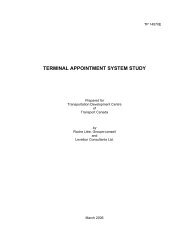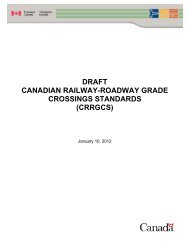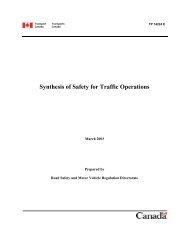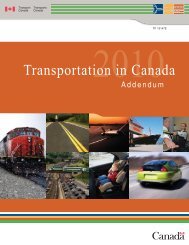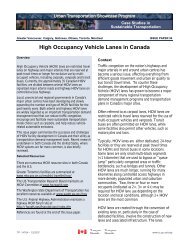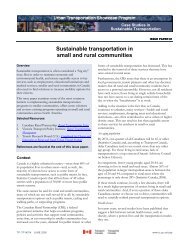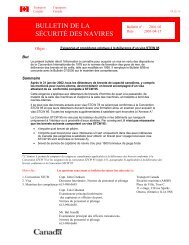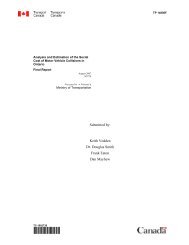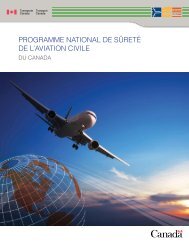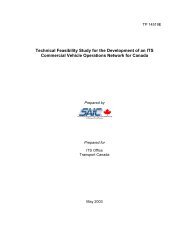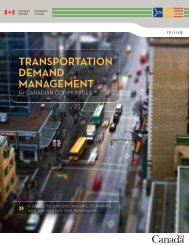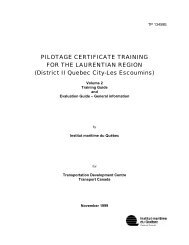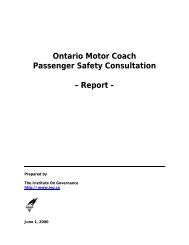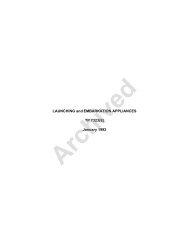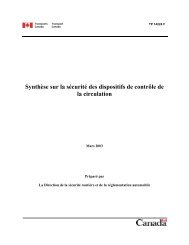MARINE EMERGENCY DUTIES - Transport Canada
MARINE EMERGENCY DUTIES - Transport Canada
MARINE EMERGENCY DUTIES - Transport Canada
You also want an ePaper? Increase the reach of your titles
YUMPU automatically turns print PDFs into web optimized ePapers that Google loves.
<strong>Transport</strong> <strong>Canada</strong><br />
Marine Safety<br />
Marine Emergency Duties<br />
Training Courses<br />
7.1 General<br />
Issue Date: May 1998<br />
Date of revision: June 2007<br />
Small Non-Pleasure Vessel Basic Safety<br />
(MED A3)<br />
Small Non-Pleasure Vessel Basic Safety (MED A3)<br />
Ref.: TP 4957E<br />
Page 32 of 82<br />
Chapter 7<br />
Revision No 1<br />
1) This chapter describes a course providing basic safety training for crew members of nonpleasure<br />
vessels of not more than 150 gross tonnage operating not more than 25 nautical<br />
miles from shore.<br />
2) Refer to section 205 of the Marine Personnel Regulations for details regarding the<br />
applicability of this course, depending on vessel type and voyage class.<br />
7.2 Equipment requirements<br />
1) One approved lifejacket, one immersion suit and one Personal Flotation Device;<br />
2) Two approved life buoys, one with line and the other with light;<br />
3) One dry chemical portable extinguisher;<br />
4) Hand flares and parachute flares (a live demonstration by Coast Guard Boating Safety<br />
may be substituted);<br />
5) Visual or audio-visual presentation of cold water shock, swimming failure, hypothermia,<br />
post-rescue collapse, their effects, and ways of overcoming them.<br />
7.3 Duration<br />
Minimum 8 hours, including 1.5 hours for practical exercises and 0.5 hours for<br />
evaluation, assuming some pre-course reading is assigned. Training providers are<br />
cautioned that students who do not complete a certain amount of pre-course reading may<br />
require more than 8 hours to complete this course.<br />
7.4 Specific instructor qualifications<br />
The main course instructor must hold a Master certificate not lower than a Fishing<br />
Master, Fourth Class certificate, a Master, Limited certificate or a Watchkeeping<br />
Engineer, Motor-driven Fishing Vessel certificate. If the course is under the supervision<br />
of more than one instructor, the assistant instructors must hold qualifications related to<br />
the marine industry or have related skills and be approved in accordance with the Quality<br />
Management Manual – Marine Personnel Standards and Pilotage, referred to in<br />
Chapter 3.<br />
7.5 Goals and criteria<br />
To provide course participants with:<br />
a) a basic understanding of the hazards associated with the marine environment and<br />
their own vessel, and of how to prevent shipboard incidents including fire;<br />
b) the knowledge necessary to raise and react to alarms and deal with emergencies;<br />
c) an ability to provide assistance in fire and abandonment situations;



